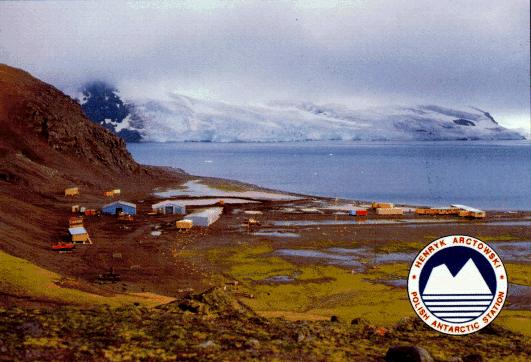
The Polish Station Henryk Arctowski, situated in Admiralty Bay, King George Island, has operated continuously since its founding in 1977. As a result of its establishment Poland became the 13th Consultative member of the Antarctic Treaty, the organization which now numbers 24 members. Operated by the Polish Academy of Sciences, this medium sized station can accommodate up to 70 people during the summer season, and 20 during the winter. Ten people are generally required to maintain the station on a daily basis. In 1992, 11 people spent the winter at the base. Since 1997 there has been continuous research in the fields of Oceanography, Geology, Geomorphology, Glaciology, Meteorology, Climatology, Seismology, Magnetism, and particularly Ecology, Research into the living resources of the Southern Ocean are directly related to fishing fleets' activities in this region.
Such research is required of Poland as a signatory of both CCAMLR and the ATCM. Between 1976 and 1989, the Institute of Ecology and the Sea Fisheries Research Institute of Gdynia cooperated in five marine expeditions to the South Shetlands on board the research vessel Profesor Siedlecki. These were conducted within the framework of the BIOMASS program, the scientific basis of which was complementary to research carried out at Arctowski station. In addition, research on the base is closely connected to other international scientific programs coordinated by SCAR, such as BIOTAS, EASIZ, and GLOBAL CHANGE. The principal role of the base is to serve as an ecological and earth sciences observatory. More than 1000 Poles have worked at the station. Of these, 230 were scientists representing various Polish universities and institutes within the Polish Academy of Sciences. As a result of research conducted at Arctowski station 29 Masters degrees, 14 PhD's, 6 'habilitations', and 3 Professorships have been awarded.
Within the Biological sciences almost 290 papers have been published, including many in foreign journals. A similar number have also been published in Geology, Paleontology, and other earth sciences, Admiralty Bay is widely considered a perfect area for such multi-disciplinary research.
Polish scientists have cooperated with fellow workers from many countries including Argentina, Belgium, Brazil, Chile, Germany, the Netherlands, New Zealand, Peru, the former Soviet Union, the United Kingdom, and the United States. In the near future we are looking for closer cooperation with other international bodies such as the ESF and EEC countries. Collaboration also exists in the area of logistical support.
The ten countries which now operate station on King George Island cooperate frequently. The newly formed Department of Antarctic Biology (PAS), directed by Prof. S. Rakusa-Suszczewski, is responsible for the stations operation and further development.
Arguments for the continued use of the station as a scientific base remain solid and unquestioned. In order to ease some of the problem imposed on the station by recent financial upheavals in Poland, the 'Henryk Arctowski Foundation' has been established by the Polish Academy of Sciences.